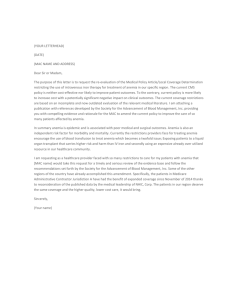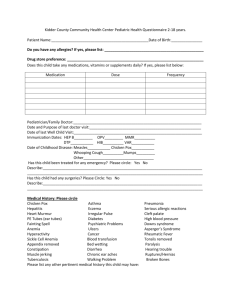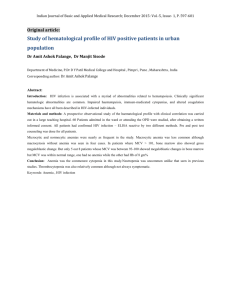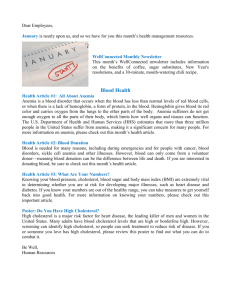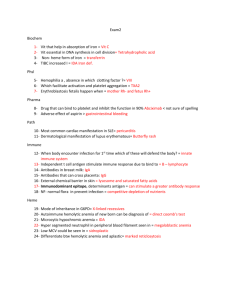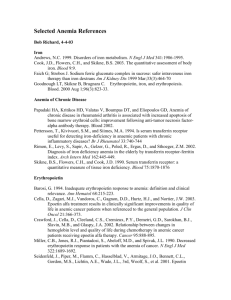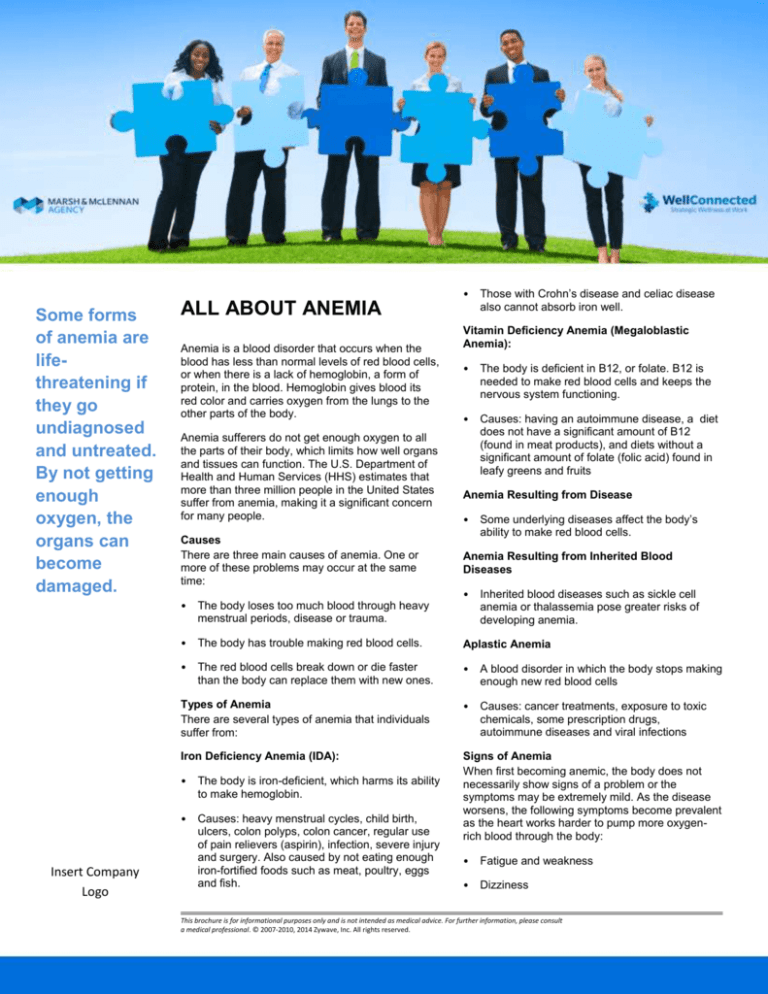
•
Some forms
of anemia are
lifethreatening if
they go
undiagnosed
and untreated.
By not getting
enough
oxygen, the
organs can
become
damaged.
Insert Company
Logo
ALL ABOUT ANEMIA
Anemia is a blood disorder that occurs when the
blood has less than normal levels of red blood cells,
or when there is a lack of hemoglobin, a form of
protein, in the blood. Hemoglobin gives blood its
red color and carries oxygen from the lungs to the
other parts of the body.
Anemia sufferers do not get enough oxygen to all
the parts of their body, which limits how well organs
and tissues can function. The U.S. Department of
Health and Human Services (HHS) estimates that
more than three million people in the United States
suffer from anemia, making it a significant concern
for many people.
Causes
There are three main causes of anemia. One or
more of these problems may occur at the same
time:
Those with Crohn’s disease and celiac disease
also cannot absorb iron well.
Vitamin Deficiency Anemia (Megaloblastic
Anemia):
•
The body is deficient in B12, or folate. B12 is
needed to make red blood cells and keeps the
nervous system functioning.
•
Causes: having an autoimmune disease, a diet
does not have a significant amount of B12
(found in meat products), and diets without a
significant amount of folate (folic acid) found in
leafy greens and fruits
Anemia Resulting from Disease
•
Some underlying diseases affect the body’s
ability to make red blood cells.
Anemia Resulting from Inherited Blood
Diseases
•
Inherited blood diseases such as sickle cell
anemia or thalassemia pose greater risks of
developing anemia.
•
The body loses too much blood through heavy
menstrual periods, disease or trauma.
•
The body has trouble making red blood cells.
Aplastic Anemia
•
The red blood cells break down or die faster
than the body can replace them with new ones.
•
A blood disorder in which the body stops making
enough new red blood cells
Types of Anemia
There are several types of anemia that individuals
suffer from:
•
Causes: cancer treatments, exposure to toxic
chemicals, some prescription drugs,
autoimmune diseases and viral infections
Iron Deficiency Anemia (IDA):
Signs of Anemia
When first becoming anemic, the body does not
necessarily show signs of a problem or the
symptoms may be extremely mild. As the disease
worsens, the following symptoms become prevalent
as the heart works harder to pump more oxygenrich blood through the body:
•
The body is iron-deficient, which harms its ability
to make hemoglobin.
•
Causes: heavy menstrual cycles, child birth,
ulcers, colon polyps, colon cancer, regular use
of pain relievers (aspirin), infection, severe injury
and surgery. Also caused by not eating enough
iron-fortified foods such as meat, poultry, eggs
and fish.
•
Fatigue and weakness
•
Dizziness
This brochure is for informational purposes only and is not intended as medical advice. For further information, please consult
a medical professional. © 2007-2010, 2014 Zywave, Inc. All rights reserved.
ALL ABOUT ANEMIA
•
Headache
•
Eat iron-rich foods such as cereal, bread, lentils,
beans, tofu, leafy vegetables, lean red meat,
fish and dried fruits.
•
Numbness or coldness in the hands and feet
•
Low body temperature
•
Eat and drink foods that help your body absorb
iron such as organic juice, strawberries and
broccoli.
•
Pale skin
•
Rapid or irregular heartbeat
•
Find alternative ways of obtaining calcium into
your diet, as too much can hurt your body’s
ability to absorb iron.
•
Shortness of breath
•
Chest pain
•
Eat a balanced diet and avoid fad diets.
•
Irritability
•
•
Jaundice (yellow-tinged skin)
Take vitamin supplements (talk with your doctor
before doing so).
•
Yellowing of the whites of the eyes
•
Enlarged spleen
•
Dark, tea-colored urine
•
Developmental delays and behavioral
disturbances (in infants and preschool children)
Diagnosis
To determine if you have anemia, your doctor will
perform a CBC blood test, give you a physical
exam, discuss your diet and the prescriptions you
are taking, and listen to your family history. If you
are diagnosed with anemia, your doctor will do
further tests to determine the exact cause of the
disease.
Treatment Options
Your doctor will most likely prescribe medication
depending on the variation of anemia that you
suffer from. He or she may also recommend that
you take vitamin supplements if you suffer from IDA
or vitamin deficiency anemia.
Prevention
Though the disease is not preventable in all
instances, there are things you can do to reduce
your risk of becoming anemic:
For more information about anemia, visit
•
The Division of Nutrition and Physical Activity
www.cdc.gov/nccdphp/dnpa
•
The American Dietetic Association
www.eatright.org
•
The Aplastic Anemia & MDS International
Foundation, Inc. www.aamds.org
•
The Iron Disorders Institute at
www.irondisorders.org

